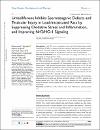Umbelliferone inhibits spermatogenic defects and testicular injury in lead-intoxicated rats by suppressing oxidative stress and inflammation, and improving Nrf2/HO-1 signaling

View/
Date
2020-01-01Author
Alotaibi, Mohammed F.Al-Joufi, Fakhria
Seif, Howida S.Abou
Alzoghaibi, Mohammed A.
Djouhri, Laiche
Ahmeda, Ahmad F.
Mahmoud, Ayman M.
...show more authors ...show less authors
Metadata
Show full item recordAbstract
© 2020 Alotaibi et al. Introduction: Lead (Pb) is an environmental toxic metal that threatens human health. Umbelliferone (UMB) is a coumarin with known medicinal and protective properties against cytotoxicity. This study explored the ameliorative effect of UMB against Pb-induced testicular toxicity in rats, focusing on steroidogenesis, oxidative stress and inflammation. Materials and Methods: Rats received lead acetate (50 mg/kg) and UMB (25, 50 or 100 mg/kg) via oral gavage for 4 weeks. Results: Pb-intoxicated rats exhibited testicular tissue injury and decreased serum levels of LH, FSH and testosterone. The count, viability, motility and normal morphology of the sperms were decreased accompanied with downregulated steroidogenesis markers in Pbinduced group. UMB prevented testicular injury, increased serum levels of LH, FSH and testosterone, upregulated steroidogenesis markers and improved the semen quality. In addition, UMB attenuated oxidative stress and oxidative DNA damage, downregulated the expression of pro-inflammatory mediators and Bax, boosted antioxidant defenses and Bcl2, and upregulated Nrf2/HO-1 signaling in Pb-intoxicated rats. Conclusion: UMB prevents Pb-induced testicular injury by suppressing oxidative damage, inflammation and cell death, and boosting antioxidant defenses, Nrf2/HO-1 signaling and pituitary-gonadal axis. Thus, UMB may represent a protective and cost-effective agent against Pb testicular toxicity, pending further investigations to elucidate other underlying mechanisms.
Collections
- Medicine Research [1739 items ]

